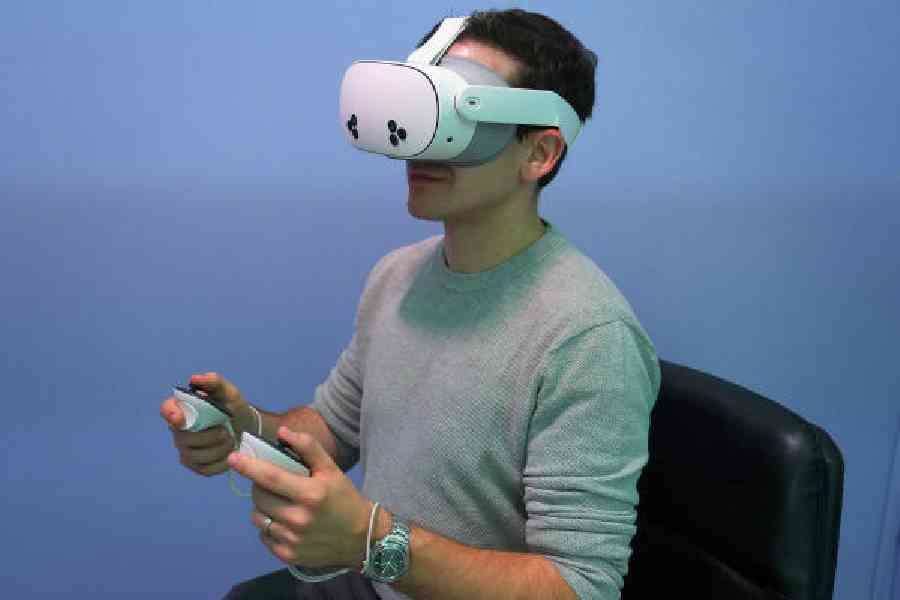Mark Zuckerberg has spent billions of dollars, hired thousands of employees and worked for roughly a quarter of his life in pursuit of a vision: a future in which the physical and digital worlds are interwoven to connect people around the globe.
The dream still seems far-fetched. But recently,his company Meta took one step closer.
Meta introduced a series of new products during an event at its headquarters in Menlo Park, California, US, including an updated, low-cost version of its Quest 3S virtual reality headset; a pair of prototype glasses with holographic technology built into the lenses; and a series of enhancements to its artificial intelligence assistant, Meta AI.
Those updates will bring a host of celebrity voices to the AI assistant — including those of Awkwafina, John Cena and Dame Judi Dench — that will respond to users when asked questions. The assistant is incorporated across most of Meta’s largest apps, including Instagram, WhatsApp, Messenger and Facebook.
The new products are Zuckerberg’s attempt to meld his vision of what social networks can be with what is possible now. Though Meta has had some success selling its virtual reality headsets and a surprise hit in its Ray-Ban augmented reality glasses, Zuckerberg’s metaverse is still years from reality.
“We can start to see how the future of computing and human connection are going to look,” he said at the event. “It’s happening.”
In the last few years, Meta has spent nearly $50 billion on its Reality Labs division — the part of the company working on hardware. It does not stand to turn a profit anytime soon. That is on top of the increasingly high costs of Meta’s expansion into AI and data centres.
By building millions of smart glasses and VR headsets, Zuckerberg hopes to bring the many people who already use his apps into a different kind of social network. And by coupling those products with the Meta AI assistant, he hopes he can make them useful enough for people to want to come back to them regularly.
The company said more than 400 million people have already used Meta AI, and 200 million use the smart assistant on one of the company’s products each week.
Some of Meta’s new ideas are risky. The company will begin to insert AI-generated posts in users’ Facebook and Instagram feeds. The move could alienate people who do not want to see such content, which could include images based on users’ interests that the company has gleaned from browsing behaviour, and even photos of a user’s own face.
Not all of Meta’s AI projects have panned out. The company shuttered a product that had allowed usersto talk with celebrity chatbots, including ones based on Snoop Dogg and Tom Brady, after less than a year on the market.
For its smart glasses, Meta is banking heavily on its partnership with EssilorLuxottica, the largest eyewear conglomerate in the world. Early sales are promising, and Meta is trying to introduce more features. Meta has also been in talks to purchase a minority stake in the eyewear company.
The new features include a live translation option. The glasses can translate conversations between people in English, Spanish, Italian and French. Meta is also working with a company called Be My Eyes to help people with vision impairments receive audio descriptions of the world around them using AI and the cameras inside the glasses.
Meta’s biggest bet is still experimental. During the event, Zuckerberg showed off Project Orion,a pair of smart glassesthat go beyond the company’s existing Ray-Bans by adding digital technology inside the lenses.
That technology, Meta hopes, will allow users to do things like sit in a living room and have a conversation with a friend from across the world while looking at the person’s digital avatar, as if the friend was next to them on the couch.
Zuckerberg argues that these enhanced glasses could one day replace smartphones. In his telling, Orion will allow people to use apps and features they would otherwise be using on a smartphone, but without staring down at a different device. The glasses will be controlled via voice, touch or in an experimental “wrist-based neural interface” that relies on a hardware bracelet and a flick of the wrist.
Much of Zuckerberg’s vision is still theoretical. And if relatively slow user adoption is an indicator, it’s still a long way in the future.
But he remains an optimist. He believes that the products introduced now will ultimately be embraced by millions of people once they are able to try them out.
“I think the way to look at these glasses is as a time machine,” Zuckerberg said. “They are a glimpse of a future that is pretty exciting.”











